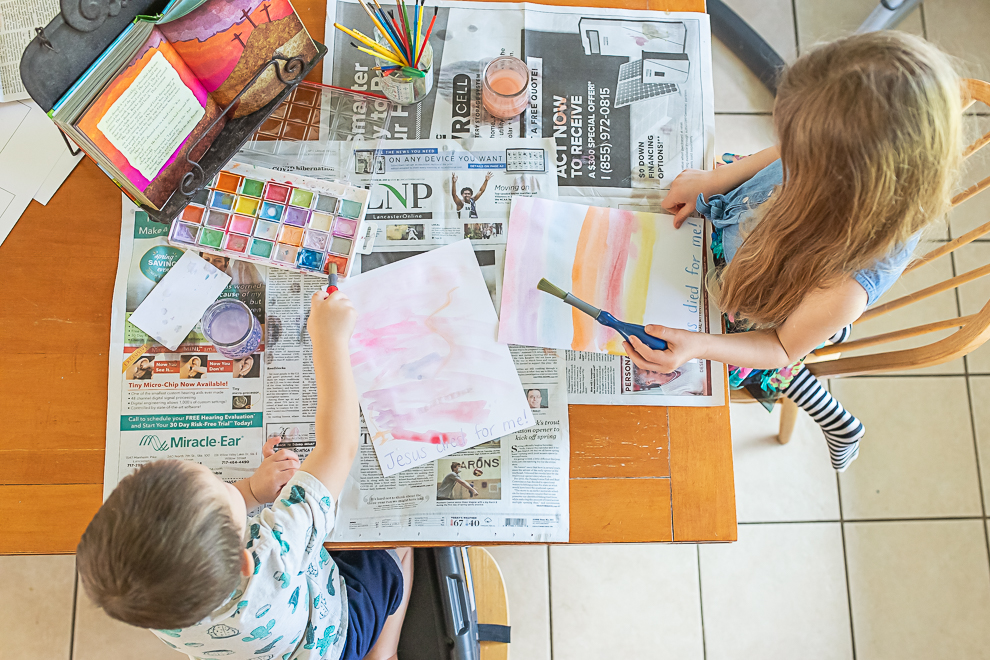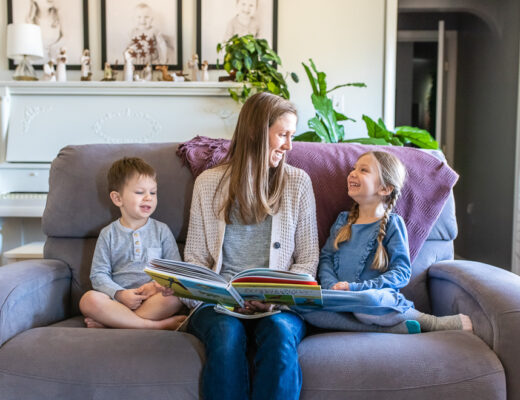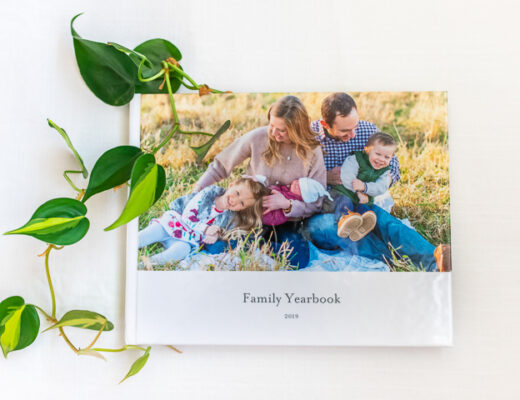Created by Mike & Mollie. Subscribe to our blog.
Written by Mollie. Subscribe to our blog.
Nearly six years ago, I entered into one of the most rewarding, yet challenging seasons of life– parenthood. Not knowing much about raising a newborn baby, I made sure to prepare myself for the new journey.
I read the most well-known sleep training books, took classes at the hospital, decorated the perfect nursery, washed and ironed all her dresses, and made dozens of little headbands.
Once she was finally here, she slept, ate, and behaved like a newborn baby typically does. All was going to “plan”. But soon she started going off script and I found myself feeling a mix of different emotions– confused, frustrated, sleep deprived, and to be honest, even hints of jealousy as I compared the milestones and successes of my baby to those of my friends.
In my quest to figure out how to control the habits of my baby, I continued to read countless blog posts, trying to “fix” her. But it was a simple phrase that my husband shared one day that would become a pivotal reminder for me not only as I raised this baby, but also for the next 6 years as I journeyed through all the stages of early childhood.
“She’s not a robot”.
Obviously kids are not metallic, high-functioning, programmed little robots. So why do we often drive ourselves to the breaking point when they don’t do as we say and act as we wish?
There’s no simple answer to this question. But there is a helpful way to reframe our mindset and expectations as a parent. Remembering this phrase that still rings true even 6 years later reminds me that I can strive to do my best to provide a loving, patient relationship with my children, but the ways that they act are really outside of my direct control.
The gift of loosening our grip on control
There are certain pieces of wisdom that every new or struggling parent should internalize. This nugget of wisdom, if remembered at just the right time, can release you from a cycle of self-pity or even self-blame.
Kids are not robots.
Wouldn’t it be nice if they could be programmed to perform exactly how we desire? But that’s not reality or how humans behave.
Up until you’ve had children, most of your interactions have been with reasonable humans. They stop if you ask them to, respond mostly how you would expect, and generally go out of their way not to inconvenience others.
That all changes when you have kids!
Now, a large percentage of your interactions are with wonderful little creatures that, while fully human and completely loveable, act in a way that is frighteningly hard to predict.
And because kids are not robots, they can’t be expected to perform, say, or think reasonably sound ideas, because after all, they’re just kids, not robots.
Finding the happy medium
Being a parent for almost 6 years now and having 3 babies, each with their own personalities and challenges, has taught me to not only hear but believe the phrase that my husband constantly reminds me of when parenting gets hard.
Kids are not robots.
Until I release myself from the pressure that it’s my fault when they act like wild animals instead of human beings, I will constantly be frustrated, worried, and doubt my abilities as a parent.
I’ve learned that I can encourage my children to eat healthy foods by offering a variety of options, but not force them to eat perfectly.
I’ve learned that kids have an enormous amount of energy, and when they squirm at the table, fall out of their seat, or don’t stand still while waiting in a line, it’s okay to allow their little bodies to exert that energy.
I’ve also learned that I can teach my children kindness and ways we can love others, but when they say things that are unkind or disrespectful, I give them grace to try again.
I can live my life being a drill sergeant (and sometimes I really sound like one!) as I try to dictate the ways that they should behave, sleep, eat, and talk. Or I can release myself of the pressure of control and realize that they are children who are constantly growing and learning. What they need is patient guidance and consistent boundaries, not a drill sergeant.
Realizing that I can’t control certain aspects of my children that I’d like to be able to, forces me to find a happy medium– a place where I allow myself to let certain things go and not let their imperfections take control of my day.
What are the benefits to my children?
When I release myself from the responsibility of being in total authority over my children, it allows me to enjoy this season of parenthood immeasurably more, and for my kids to enjoy me as their mother more too.
The times my husband gently reminds me that our kids are not robots, are the times when I feel that I’ve spent a good part of my day being frustrated at their actions instead of loving them in spite of the challenges.
When we try to control our children in a way such as this, it will inevitably produce negative feelings in them. Our patience runs thin, we become stressed, and the little things that make them cute and funny just seem to be more of an annoyance rather than something that is cherished about childhood.
When we spend more of our time letting them be kids rather than making them mini-adults, this allows kids to learn and grow from their mistakes and allows us as parents to teach them in a healthy, loving way that shows grace.
Since we shouldn’t expect kids to reason, act, or think like little adults, we need to take that into consideration when giving them guidance.
I learned to gently rock and nurse my youngest when he woke up in the middle of the night instead of being frustrated that he wasn’t sleeping through the night.
When my potty-trained son has an accident in his pants, I calmly change him without making him feel guilty.
If my daughter throws a temper tantrum because her brother destroyed her art project, I try to empathize with her and help her to deal with her emotions in a healthy way instead of merely scolding her for acting immature.
Studies have shown that children take on our emotions and can tell when we are stressed or anxious. Likewise, they can also see and feel when we are relaxed and have genuine love for them.
By not expecting children to act like robots, we give them space to actually behave like children will– including times of being loud, messy, cranky, uncooperative, silly, and unhelpful.
Expectations are incredibly powerful
One way that I’ve been able to find so much more joy and pleasure in this season of raising my children is to keep my expectations in check.
I’ve learned to go into each day with the expectation that my children will push back when given directions, have complaints about tasks we ask them to do, or need constant reminders to choose to be kind rather than selfish– because they’re still learning and growing.
Hopefully the way we parent them shows progress each year of their lives, but by adjusting my expectations and understanding that they sometimes need to make mistakes in order to learn, this allows me to hold a healthier approach to parenting.
When I set my expectations as such, I’m less likely to fall into the pit of disappointment when they act out instead of comply with my preconceived notions of behavior. Doing this has taught me to have more patience and appreciate the growth that I do see happening in their little lives each day.
***
🌿 Introducing, Declutter Your Life, a premium newsletter with monthly challenges to help you live a less cluttered life– inside and out.
🌿 Introducing, Declutter Your Life, a premium newsletter with monthly challenges to help you live a less cluttered life– inside and out.




